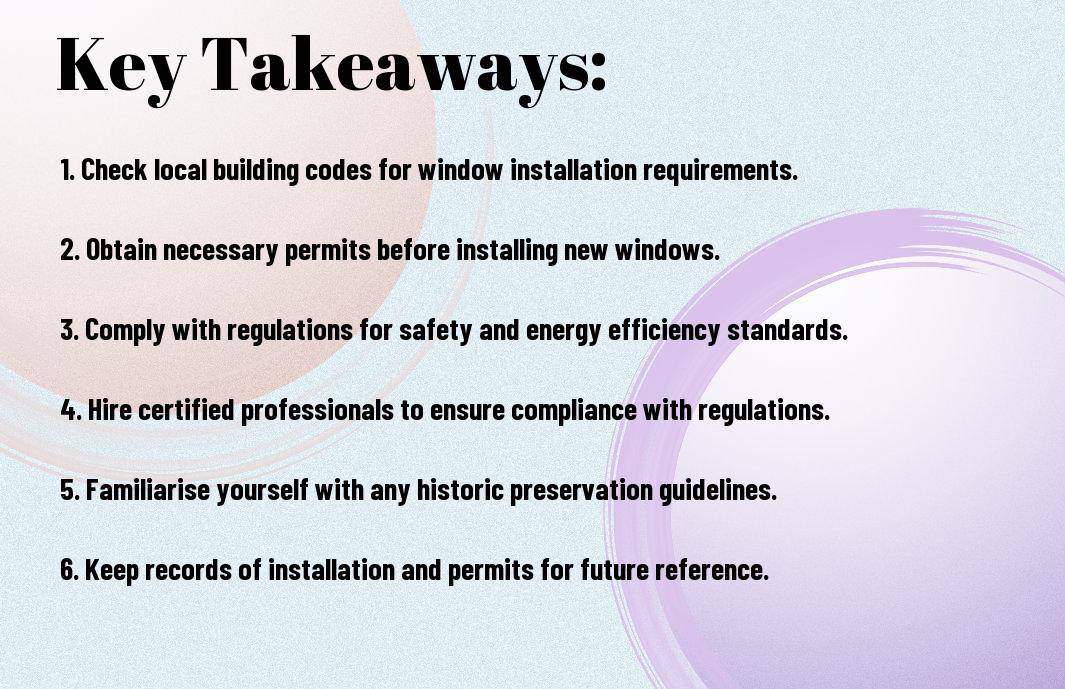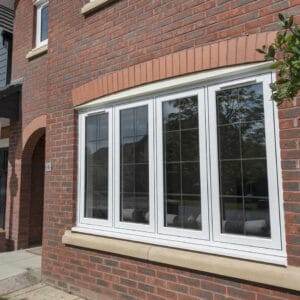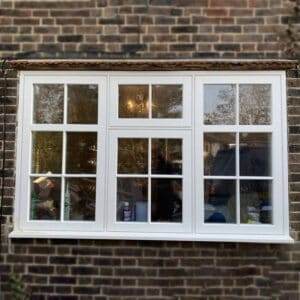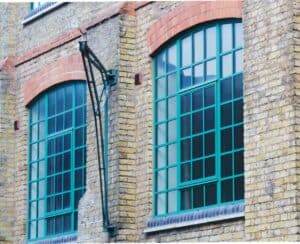In order to comply with local building codes and ensure the safety of your home, it is crucial to understand the regulations for window installation in your area. Failure to adhere to these regulations could result in serious consequences, including fines and potential damage to your property. Additionally, by understanding and following these regulations, you can ensure that your windows are installed securely and contribute to the overall energy efficiency of your home. This informative blog post will provide you with the essential information you need to navigate the regulations for window installation, helping you make informed decisions and avoid costly mistakes.
Key Takeaways:
- Compliance with Regulations: It is essential to understand and comply with the specific window installation regulations in your local area to avoid any legal issues.
- Permits and Permissions: Make sure to obtain any necessary permits or permissions required for window installation from the relevant authorities.
- Building Codes: Familiarise yourself with the building codes and standards that govern window installation to ensure they are met during the process.
- Professional Installation: Hiring a qualified and experienced professional for window installation can help ensure that all regulations are adhered to.
- Inspections and Certifications: After the installation, it is important to seek inspections and certifications to verify compliance with regulations and standards.

Understanding Local Building Codes
When it comes to installing windows in your area, it is crucial to have a clear understanding of the local building codes. These regulations are put in place to ensure the safety and structural integrity of buildings, as well as to maintain the aesthetic appeal of the neighbourhood.
Researching Your Area’s Specific Codes
Before embarking on any window installation project, it is essential to thoroughly research your area’s specific building codes. This may involve contacting the local council or building department to obtain the relevant information. It is important to be aware of any restrictions or requirements that may affect the type, size, and placement of windows in your property.
Navigating Zoning Laws and Permits
In addition to building codes, navigating zoning laws and permits is another crucial aspect of window installation. Zoning laws dictate how properties can be used and what structures can be built, while permits are official approval from the local authorities to proceed with construction work. It is important to obtain the necessary permits and adhere to zoning laws to avoid any legal complications or penalties.
Failure to comply with zoning laws and permit requirements can result in fines, delays in construction, and even the removal of non-compliant windows.

Types of Windows and Associated Regulations
When it comes to window installation, it’s important to understand the different types of windows and the regulations associated with each type. From casement windows to double-hung windows, there are specific requirements that must be met to ensure compliance with building codes and safety standards.
- Size and placement: Regulations dictate the size and placement of windows to ensure proper ventilation and emergency escape routes
- Glazing requirements: Certain areas may have regulations on the type of glass used in windows for safety and energy efficiency
- Structural integrity: Windows must meet structural requirements to withstand environmental factors and potential impact
- Fire safety: Specific regulations apply to windows in areas that require fire safety measures
- Energy efficiency: Some regions have regulations to ensure windows meet energy efficiency standards
Understanding the regulations for different types of windows is vital to ensure compliance with local building codes. Thorough research and consultation with professionals are essential to avoid any potential issues during the installation process.
Egress Window Requirements
One specific area of regulation that homeowners should be aware of is the requirements for egress windows. Egress windows are designed to provide emergency exits in case of a fire or other emergencies. These windows must meet specific size and placement criteria to comply with building codes and ensure the safety of occupants.
Energy Efficiency and Environmental Standards
Another important aspect of window regulations is related to energy efficiency and environmental standards. Certain regions have specific requirements for windows to meet energy performance ratings and environmental impact standards. Compliance with these regulations can lead to long-term cost savings and a reduced environmental footprint. It’s crucial for homeowners to consider these regulations when choosing windows for their properties.
When selecting windows, homeowners should look for options that meet energy efficiency and environmental standards to benefit from lower energy bills and contribute to a sustainable future.

The Installation Process
When it comes to the installation of new windows, it is crucial to understand the regulations and requirements in your area. Energy-efficient Windows and Building Codes: Navigating through these regulations is essential for ensuring that your window installation is compliant and meets the necessary standards.
Selecting a Certified Contractor
One of the most important steps in the installation process is selecting a certified contractor. Choosing a reputable and certified contractor ensures that the installation will be carried out to the highest standard and in compliance with regulations. It is important to verify the credentials and experience of the contractor before making a decision.
Steps to Ensure Compliance During Installation
During the window installation process, it is crucial to adhere to the building codes and regulations set out by your local authority. This includes obtaining the necessary permits and ensuring that the installation is carried out by qualified professionals. Regular inspections may also be required to ensure compliance throughout the installation process.
It is important to keep records of all the steps taken to ensure compliance during the installation. This includes documentation of permits, inspections, and any necessary adjustments made to meet the regulations.
Special Considerations
When it comes to window installation, there are several special considerations to keep in mind to ensure compliance with local regulations. Understanding the specific requirements for your area is crucial to avoid potential issues down the line. For more information on residential window code requirements, you can refer to Residential Window Code Requirements.
Historical Districts and Special Zones
In historical districts and special zones, there are often strict guidelines in place to preserve the architectural integrity of the area. These regulations may dictate the type of windows allowed, the materials that can be used, and the design aesthetics that must be adhered to. It is important to consult with the local authorities or historic preservation boards to ensure compliance with these requirements before proceeding with any window installation.
Variance Petitions and Exemptions
In some cases, homeowners may need to seek variance petitions or exemptions from certain window installation regulations. This process typically involves submitting a formal request to the local building department or zoning board, outlining the specific reasons why the deviation from the standard regulations is necessary. However, it is important to note that securing a variance or exemption is not guaranteed and may require extensive documentation and justification.
It is essential to fully understand the implications of seeking a variance or exemption, as non-compliance with local regulations can result in significant penalties and delays. It is always advisable to work with experienced professionals who are well-versed in local building codes and regulations to navigate this process effectively.
Understanding the specific regulations for window installation in historical districts and special zones is crucial to avoid potential issues. Seeking variance petitions or exemptions may be necessary in some cases, but it is important to be aware of the complexities and potential challenges involved in this process. Working with professionals who have a comprehensive understanding of local regulations can make a significant difference in ensuring a successful window installation project.
Understanding the Regulations for Window Installation in Your Area
Q: What are the regulations for window installation in my area?
A: The regulations for window installation vary by location and can be influenced by factors such as building codes, conservation areas, and listed buildings. It is important to consult your local planning department or a professional to understand the specific regulations in your area.
Q: Do I need planning permission to install new windows?
A: In some cases, planning permission may be required for window installation, especially if you live in a conservation area or your property is a listed building. It is advisable to check with your local planning authority before commencing any work.
Q: What safety regulations should I consider for window installation?
A: Safety regulations for window installation may include requirements for child safety features, fire escape routes, and the use of toughened or laminated glass in certain locations. Compliance with these regulations is essential for the protection of occupants and to avoid potential legal issues.
Q: Are there regulations for energy efficiency in window installation?
A: Yes, there are regulations and standards for energy efficiency in window installation, such as Building Regulations in the UK. These regulations aim to improve the thermal performance of windows to reduce heat loss and energy consumption. It is important to select windows that meet these standards to comply with the regulations.
Q: What should I consider when replacing windows in a listed building?
A: When replacing windows in a listed building, it is crucial to comply with specific regulations for conservation and preservation. This may involve using materials and designs that are in keeping with the original features of the building and obtaining special permissions from the local planning authority. Consulting a conservation officer or heritage professional is recommended for guidance in these cases.













